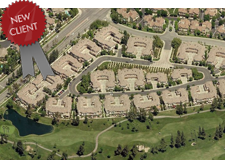
In its third consecutive year of severe drought, California faces a historic water shortage and wildfire danger. According to Mashable.com and US Drought Monitor, “The entire state is in some stage of drought, with 77% of the state suffering from ‘extreme’ to ‘exceptional’ drought conditions.” Matters are expected to worsen, as California continues to experience its hottest year on record.
In response to these conditions, Governor Brown signed an Emergency Drought Proclamation in January 2014 declaring a state of emergency and calling upon all Californians to voluntarily reduce their water usage by 20 percent. As residents of homeowners associations (“HOAs”) began responding to the Governor’s plea by reducing their irrigation, HOAs fined their members for failure to maintain their yards in accordance with the governing documents. This led to swift action by both the Governor and the California Legislature.
In April, Governor Brown signed an Executive Order which effectively prohibits HOAs from fining, or threatening to fine, homeowners “who comply with water conservation measures.” The Order further provides that “any provision of the governing document, architectural or landscaping guidelines, or policies of a common interest development will be void and unenforceable to the extent it has the effect of prohibiting compliance with the water-saving measures contained in this directive.” One of these water-saving measures is to limit outdoor watering to no more than twice per week.
The California Legislature is also considering three bills related to drought relief, which would impact HOAs. AB 2100 (Campos) and SB 992 (Nielsen) would prohibit HOAs from imposing a fine or assessment against a member for reducing or eliminating water of vegetation or lawns during a Governor-declared state of emergency, or a local government-declared emergency, due to drought. If passed, these bills would take effect immediately as urgency statutes. AB 2104 (Gonzalez) would provide that a provision of the governing documents, including the architectural or landscape guidelines, is void and unenforceable if it would have the effect of prohibiting low water-using plants as a group, or as a replacement of existing turf, or if it has the effect of restricting compliance with water conservation measures. The California Legislative Action Committee (“CAI-CLAC”) continues to seek amendments to these bills as they work their way through the legislature.
 |
It is important to note that both the Proclamation and the pending legislation are limited to periods of a Governor-declared drought. HOAs are still permitted to enforce other landscape maintenance issues, such as weeds, brush, tree trimming, etc. In addition, HOAs may continue to enforce irrigation provisions, provided they are within the parameters outlined in the Order or as set forth by the local water agency. HOAs considering changes to their architectural or landscape guidelines should seek the advice of their legal counsel.
|
Blog post authored by Tinnelly Law Group’s Director of Business Development, Ramona Acosta.
To submit questions to the HOA attorneys at Tinnelly Law Group, click here.
 We are proud to announce that The Orchards Community Association has selected Tinnelly Law Group as their association’s legal counsel.
We are proud to announce that The Orchards Community Association has selected Tinnelly Law Group as their association’s legal counsel. HOA Lawyer Blog
HOA Lawyer Blog


 An easement provides an individual with the legal right to a specific and definable use of another’s property. A homeowners association’s (“HOA’s”) governing documents (i.e., “CC&Rs”) often provide numerous easement rights to its members for access and use of the HOA’s common areas and recreational facilities. While those easement rights are reserved for the benefit of the HOA’s members, their guests and tenants residing in the HOA’s development, it is not uncommon for non-residents and general members of the public to utilize HOA common area facilities such as walkways, trails and parks. HOAs may run into issues when trying to exclude non-residents from those areas, and may be reluctant to take more formal measures needed to do so (i.e., the installation of controlled access gates, the use of security personnel, etc.).
An easement provides an individual with the legal right to a specific and definable use of another’s property. A homeowners association’s (“HOA’s”) governing documents (i.e., “CC&Rs”) often provide numerous easement rights to its members for access and use of the HOA’s common areas and recreational facilities. While those easement rights are reserved for the benefit of the HOA’s members, their guests and tenants residing in the HOA’s development, it is not uncommon for non-residents and general members of the public to utilize HOA common area facilities such as walkways, trails and parks. HOAs may run into issues when trying to exclude non-residents from those areas, and may be reluctant to take more formal measures needed to do so (i.e., the installation of controlled access gates, the use of security personnel, etc.). The Tinnelly Law Group is proud to announce the opening of its newest office location in Downtown Los Angeles, California.
The Tinnelly Law Group is proud to announce the opening of its newest office location in Downtown Los Angeles, California.  The popularity of electronic cigarettes (“E-Cigs”) has increased in recent years. In light of unknown health risks, many state and local governments are
The popularity of electronic cigarettes (“E-Cigs”) has increased in recent years. In light of unknown health risks, many state and local governments are  We are proud to announce that New Chase Homeowners Association has selected Tinnelly Law Group as their association’s legal counsel.
We are proud to announce that New Chase Homeowners Association has selected Tinnelly Law Group as their association’s legal counsel. *New Library Article
*New Library Article We are proud to announce that SkyRidge Community Association has selected Tinnelly Law Group as their association’s legal counsel.
We are proud to announce that SkyRidge Community Association has selected Tinnelly Law Group as their association’s legal counsel.
 *Asked & Answered
*Asked & Answered We are proud to announce that Bayview Terrace Homeowners Association has selected Tinnelly Law Group as their association’s legal counsel.
We are proud to announce that Bayview Terrace Homeowners Association has selected Tinnelly Law Group as their association’s legal counsel.